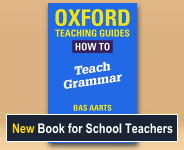Glossary: metaphor
Explanation
A word or phrase that is used to describe one thing in terms of another, where the literal ("dictionary-definition") meaning is not expressed. For example, when Shakespeare writes Juliet is the Sun, he does not mean that she actually is the sun! He means that she has some of the same qualities as the sun. The opposite of metaphorical is literal.
Metaphor is, however, pervasive in everyday language and can operate to shape our way of seeing things. Thus, 'argument' is regularly expressed in terms of to 'war' (we defend a point, attack an idea, marshall facts); we live by metaphors of time analogised as if it were a commodity - thus we spend and waste time. Such metaphors are 'dead metaphors' or sufficiently 'frozen' for them to be not really noticed, though they reveal much about how individuals and cultures shape meanings.
Englicious contains many resources for English language in schools, but the vast majority of them require you to register and log in first. For more information, see What is Englicious?

